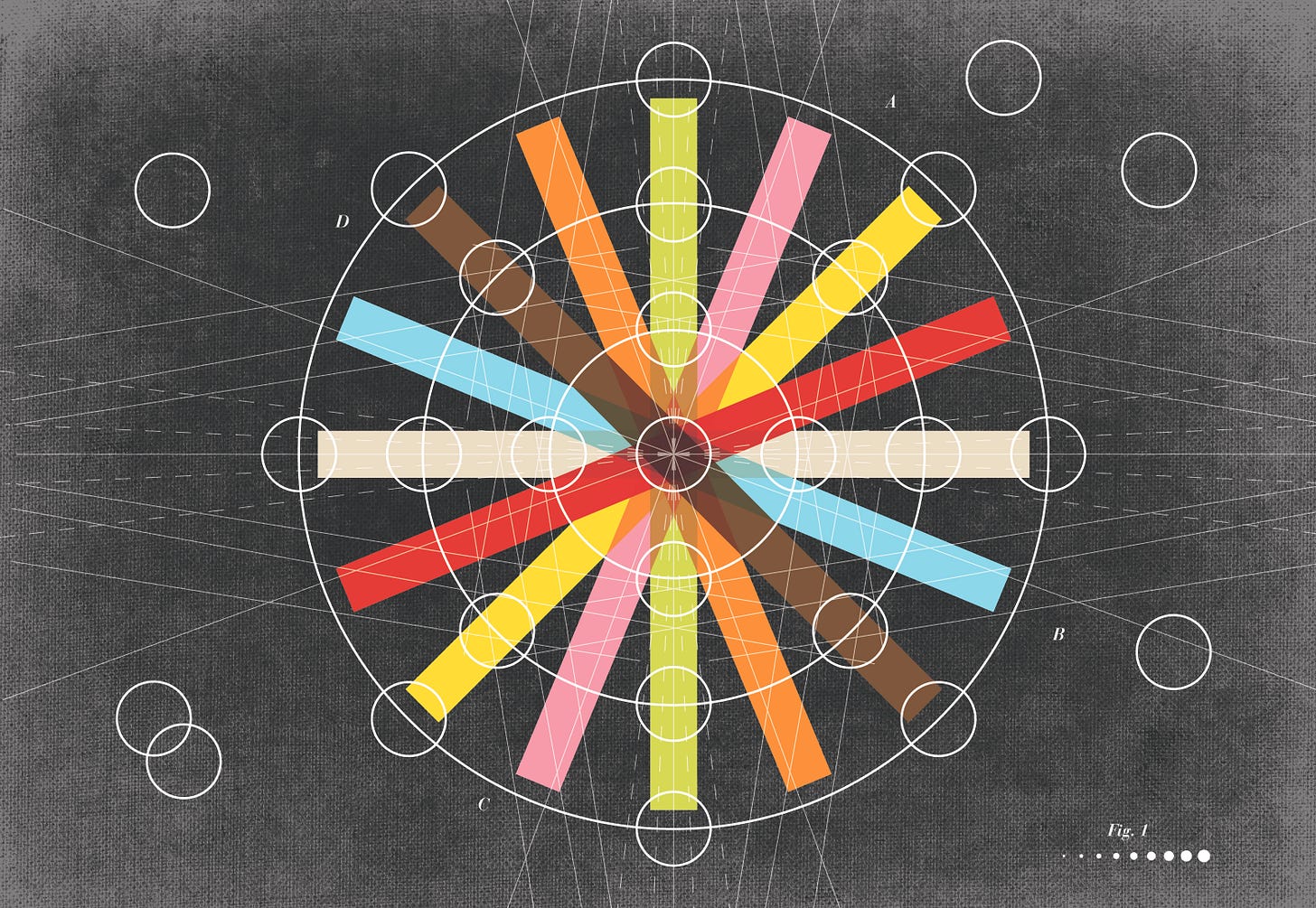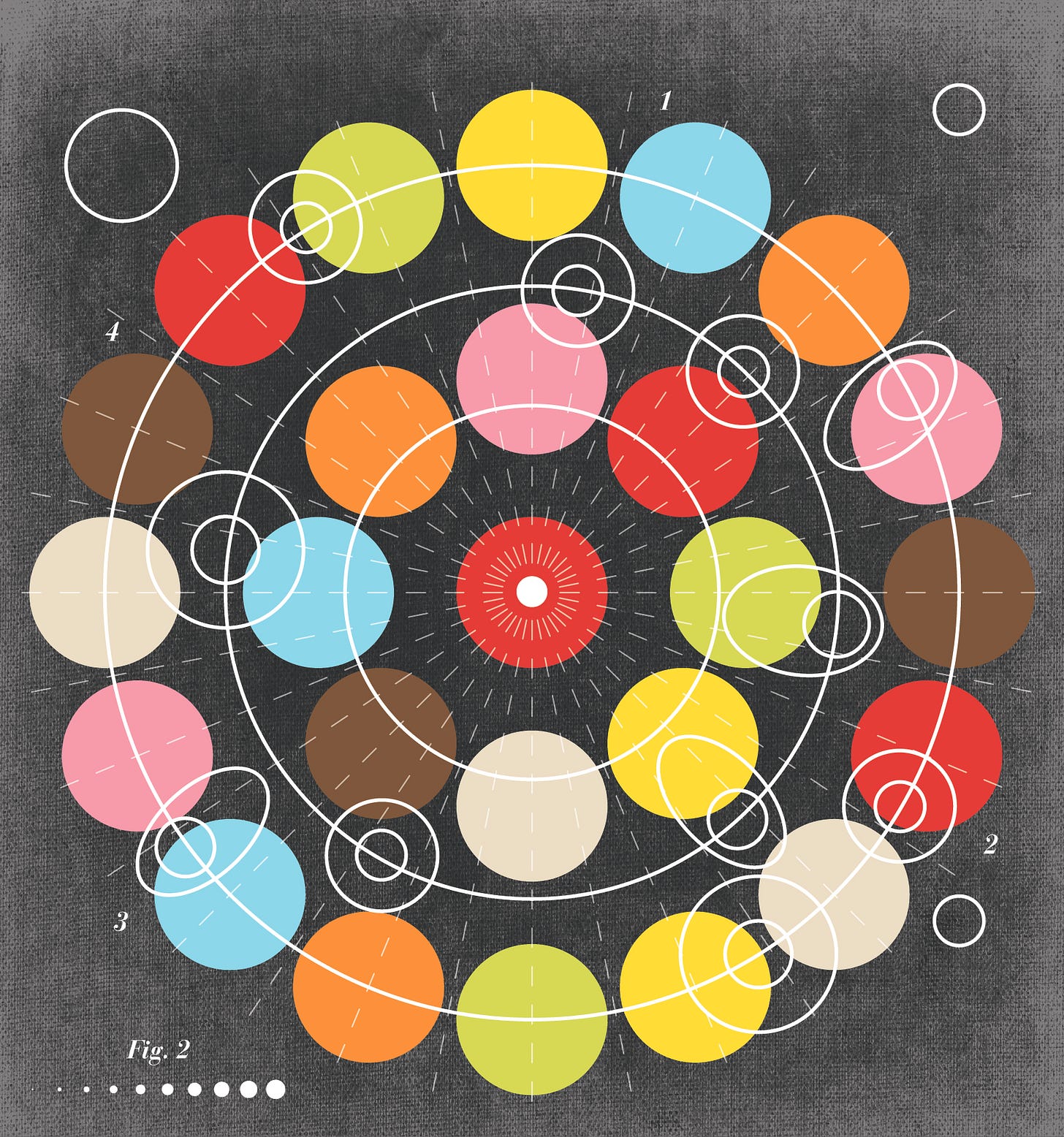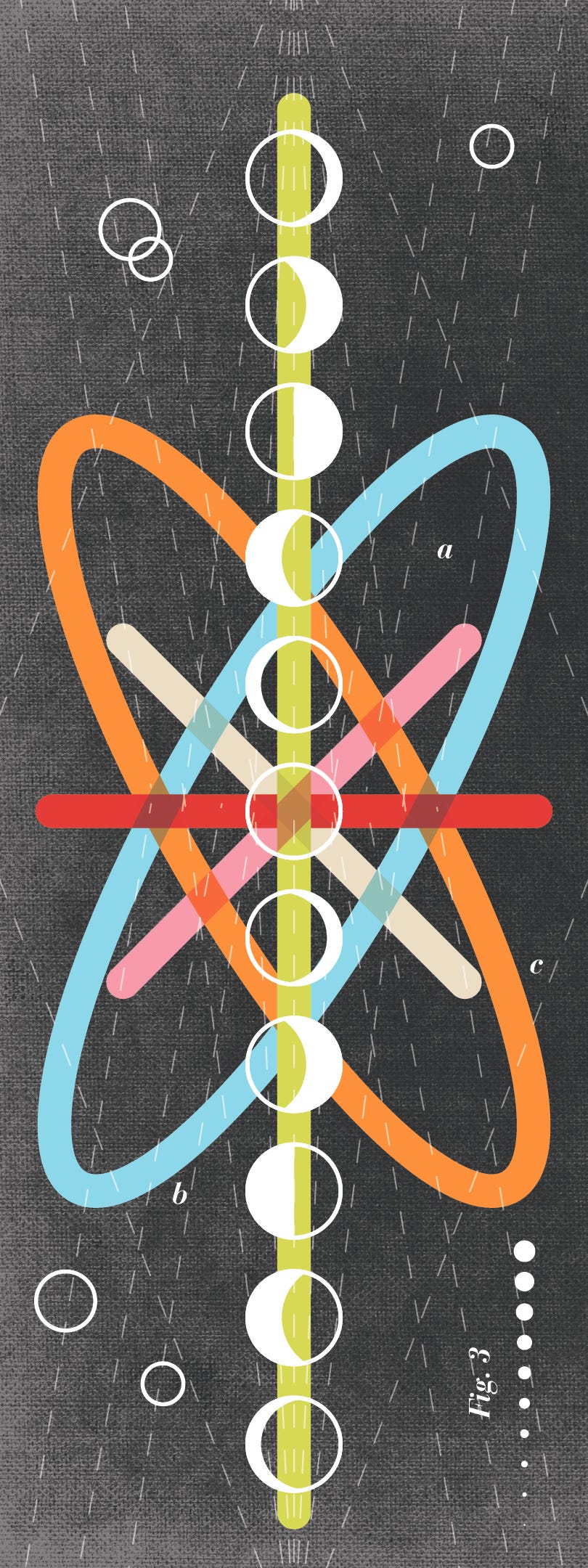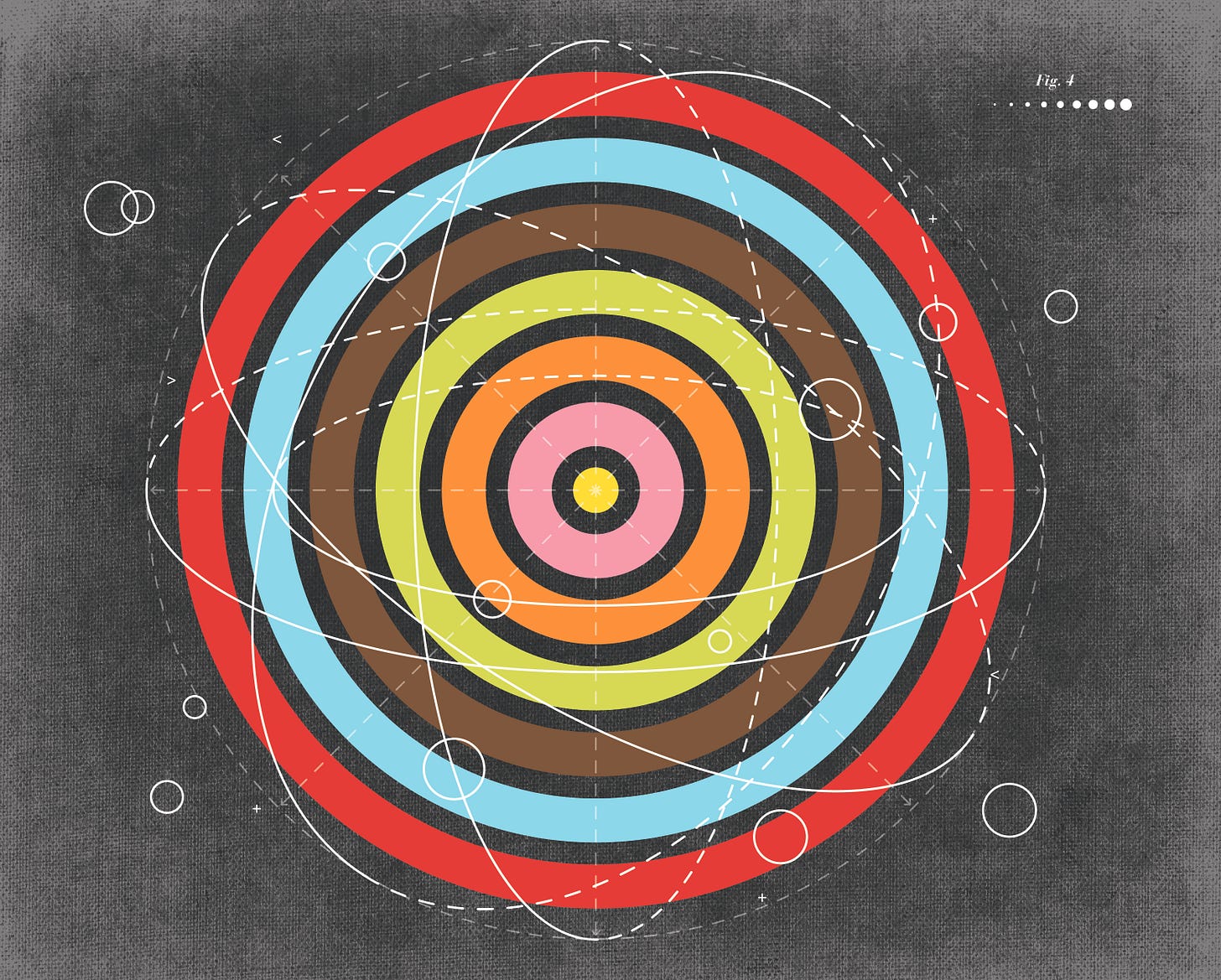Hie to Kolob
There’s a scene in the film Contact where, after traveling to the star Vega, Dr. Ellie Arroway is met by an intelligent being that greets her in the physical form of her father, chosen deliberately by the alien contact to comfort her after her bewildering journey from Earth. “You feel so lost,” the being says of humans, “so cut off, so alone. Only you’re not.” For billions of years, he explains, countless civilizations have traveled the same network of wormholes that lead Ellie to their encounter. It’s a feel-good scene, especially when he tells her that, “in all our searching, the only thing we’ve found that makes the emptiness [of space] bearable is each other.” This sentiment recalls the Restoration’s unique take on heaven as an elevated mode of relationality (see D&C 130:2).
I was reminded of both this film and the concept of celestial sociality after my wife caught up recently on a video call with some old friends from our time in Georgia. Most of us who ended up in the Atlanta area were not originally from the South, and none of us knew any of the others before moving there. For a few formative years, though, we walked side-by-side, sharing in the joys and struggles common to young families getting an education: dinners and game nights, the birth of new babies, and service in the kingdom when time was scarce. For most of us, we were each other’s family away from family. Until one day when we weren’t.
As was bound to happen, our futures followed divergent paths and life scattered us across the country. Some ended up in Washington state, others in Utah and New Jersey. My wife and I landed in Illinois. Where once we rubbed shoulders in the intimacy of daily living, now we only share occasional conversations, and we sometimes feel as distant from each other as the stars. Computer screens bridge some of the separation, but they cannot bridge long periods of mutual absence. And so we go on living our separate lives—the friendships that once burned bright at the center of our hearts now reduced to occasional flickers.
Is it by divine design that we must drift apart from those we love and who love us? If distance, disruption, and dislocation are inevitable experiences of life, where is the hand of God in guiding our paths to love, connection, and belonging? Such are the melancholy questions that disquiet my mind when my wife says goodbye to her cherished friends from Georgia, and I ask her how things went, and she answers with a subdued smile that tells me that to love others is to yearn against the entropy of creation.
I’m convinced the Restoration can respond to these questions in beautiful, if still incomplete, ways. I’m almost equally convinced that the pursuit of a response must invariably lead us down a path where God will “take hold of [us] and wrench [our] very heart strings.”1 Ultimately, however, whatever grief may accompany our experiences, I trust that it will be finally and fully “swallowed up in the joy of Christ” (Alma 31:38).
If I could hie to Kolob
In the twinkling of an eye . . .In the Pearl of Great Price, the Lord shows Enoch a vision of “all the doings of the children of men” (Moses 7: 41). The vision is well known for its image of a God who weeps, the Restoration’s response to the question of divine passibility. There is something spiritually sobering about the fact that God’s divine nature does not spare him suffering, that part of what makes him divine is his capacity for suffering. And God’s emotional experience seems contagious to those who draw near him. In Enoch’s vision, there’s a lot of “sorrow, grief, [and] anguish” to go around.2 Indeed, multiple Restoration scriptures depict the cosmos as necessarily suffused with suffering (for example, see 2 Nephi 2:11). Why is this?
One reason may be that suffering eschews the superficial. Consider that God’s weeping over his children’s (mis)use of their agency causes Enoch to weep and stretch forth his arms. We also witness that Enoch’s “heart swelled wide as eternity; and his bowels yearned; and all eternity shook” (Moses 7: 41). These are powerful, poetic metaphors for spiritual growing pains. Enoch learns in an embodied way that increased light and knowledge come at the cost of suffering (see Ecclesiastes 1:18).
Suffering in this sense has nothing to do with pain for pain’s sake. It is rather more akin to compassion (from the Latin compati, to bear or suffer with). Suffering as I mean it here would combine both (1) Lehi’s reaction to his vision—he “cast himself upon his bed” because he was so “overcome with the Spirit and the things which he had seen” (1 Nephi 1:7), and (2) the pillars of Alma’s covenant community, including a willingness to help others bear their burdens (see Mosiah 18). This is the kind of suffering the Savior referred to when he declared that “all these things shall give [us] experience, and shall be for [our] good” (D&C 122:7), and when He gave the injunction to “succor the weak, lift up the hands which hang down, and strengthen the feeble knees” (D&C 81:5).
And then continue onward With that same speed to fly . . .
When my wife and I debrief after her Zoom call with her friends, we wrestle with the difficult emotions that well up inside. Her friends are fine, she tells me, they’re getting together soon and they’d love it if she could join them. There’s a wistfulness in her voice and we both know why—decisions made long ago mean that “discretionary” travel is a luxury in our lives. We’ve made peace with our chosen path; we don’t mean to be ungrateful for the many and rich blessings that have been ours. Still, each new “No, thank you, not this time” that my wife proffers comes with a sense of loneliness that has become familiar. The fact that she has grown accustomed to being the odd one out doesn’t make the pain of her self-exclusion any less poignant. Sometimes even the wisest choices hurt—moral agency and suffering seem to be a package deal.
My wife knows her friends understand her absence, and that they love and miss her. For my part, I wonder aloud if we aren’t becoming alien to those we once called family, victims of the continual change and loss that is part of life. In moments such as this of longing for reconnection with others, my wife and I hold each other close, our resilience laced with a feeling of resignation at the “impermanence of many of the things that make life enjoyable.”
Do you think that you could ever
. . . Find out the generation . . . ?My wife’s conversation with her friends came on the heels of the solar eclipse. Although I’m not one for astronomical contemplation, I found myself wondering whether human bodies, like their heavenly counterparts, follow a pattern of movement that “witness[es] . . . [of] a Supreme Creator” (Alma 30:44). Whether there isn’t something sacred in the contrasting warmth of proximity and cold of separation in the relationships we form. One evening while I compared pictures of the eclipse on friends’ social media feeds with images of other celestial phenomena captured by the most powerful telescopes, my wife, unprompted, sat down next to me and pulled up her favorite paintings by Korean artist Yongsung Kim. I was drawn to the painting Calm and Stars, which depicts the Savior, arms outstretched, staring up at the night sky. In the painting, the Lord's cruciform body strikes a familiar pose—he stands in a boat on the water, alluding to Matthew 8:27. However, in Kim’s rendering, Christ is joined by a single oarsman, not a boatload of bewildered apostles. Has he just calmed another storm-tossed sea, as the title of the painting suggests? Or has he stolen out on a quiet night with a sea already at peace to look up and marvel at creation?
The works of God continue, And worlds and lives abound . . .
As I mulled over Kim’s painting, my mind drifted to the story of Moses and I opened my scriptures. Like Enoch, Moses spoke with God and saw splendid things he “never had supposed” (Moses 1:10). He falls to the earth, sapped of his natural strength for multiple hours. It was the vision of a single, solitary world—Moses’s own—that rendered Moses so spent (Moses 1:33). Joseph Smith once mused that five minutes of gazing into heaven would teach us more about creation than we could ever learn “by reading all that ever was written on the subject.”
Sitting in the silence of my thoughts, my eyes began to settle on subtleties of the text. I noticed there’s not much of an introduction; an unknown narrator simply states, “[t]he words of God . . . unto Moses” (Moses 1:1). I repeated the phrase, so unremarkable at first glance: the words of God . . . the words of God . . . the words of God. My curiosity was piqued. Words? Did God speak them? What language can possibly contain divine transcendence?
I rehearsed in my mind the words from verse three: “I am the Lord God Almighty, and Endless is my name.” And then again and again: I am the Lord God Almighty, and Endless is my name; I am the Lord God Almighty, and Endless is my name. I started to hear the cadence. I opened a document and rearranged the words, and the insight came: God is speaking to Moses in meter. Or at least that’s how Joseph chose to capture the exchange.
“I am the Lord God Almighty and Endless is my name; For I am without beginning of days or end of years and is not this endless?”
I counted the syllables: eight, six, eight, six, six. Yes, it’s there; I can feel it. Suddenly skeptical that I am overzealous to see in the scriptures what isn’t really there, I tried some different arrangements and got different results. Nothing compelled me to read the words this way. Yet nothing prevented me from doing so either. I took comfort in the fact that “the attempt to make the implicit explicit radically alters its nature.” The tears welling up in my eyes were confirmation enough for me—I saw God communing with us in the structured rhythm of poetry. And I began to weep.
There is no end to glory . . .
Iain McGilchrist has suggested that “poetry constitutes a ‘speaking silence.’” Silence because some truths simply cannot be rendered explicit by language; it is in their nature to remain implicit. Speaking because it is nevertheless the gift and burden of poetry to bear witness of those truths that lie beyond the referentiality of language. God’s words to Moses strike me as spoken silence. They have a musical quality found not in the notes or the gaps between the notes, but in the interplay between them. If either is missing, the music is lost. It takes Moses one verse to discern every particle of the earth, another to behold its inhabitants, and a third to see many other earths. Three verses, three notes. That leaves a lot of gaps. And yet, God is in each and every one of these vast dimensions of existence; that’s what Moses manages to discern “by the Spirit of God” (Moses 1:27).
My mind returns to Kim’s Calm and Stars, and its possible connections with Moses’s cosmic vision come into focus. Christ’s gesture no longer seems so cryptic. For me, his outstretched hands are like those of a conductor, the conductor of the musica universalis of creation. Notes and gaps, bodies and space, presence and absence, proximity and separation– all have a part to play in the grand orchestral score.
There is no end to love . . .A few weeks after my wife’s call with her friends, I posted a thoughtful article on social media. A friend of twenty years was touched and suggested that a group of us should meet up virtually once a month to discuss similar reads. The group of friends goes all the way back to our BYU days when we were young naifs, short on lived experience but long on our newfound love of Spanish literature. Although we have kept in contact occasionally, at times our shared past seems like a distant memory, the separation of two decades an unacknowledged and unmourned death.
When we meet up for our first gathering a month later, there is no pretense, only a desire to reconnect. As we visit, mental images of the art of Yongsung Kim, the visions of Enoch and Moses, and the conversation with my wife come together in a single, glorious insight. The intermittent points of contact that punctuate the silent periods of life; the bodies that orbit, now near, now far; the friendships that burn, sometimes like a fire, others like an ember—these are the notes and gaps of the music of relationship, the music of mortality, the soundtrack of lives lived in pursuit of that society we call Zion. It is a music that at times will wrench our heart strings, but it is that wrenching that will make us finally “fit for an inheritance.”3 In the end, the Lord will call us Zion because we choose to dwell in righteousness and because we have offered up our broken, wrenched hearts.
There is no death above . . .Contact ends with Ellie sitting alone on a precipice looking out over Canyon de Chelly, near Chinle, Arizona. As she contemplates the vast beauty of the Diné land, she gathers up a handful of dirt, flecks of which sparkle in the evening sun as the scene fades to a night sky filled with stars. The image is reminiscent of the opening lines from Blake’s “Auguries of Innocence”:
To see a World in a Grain of Sand And a Heaven in a Wild Flower Hold Infinity in the palm of your hand And Eternity in an hour
My family’s cherished friendships have been like sparkling fragments of a heavenly Zion. Though my heart is sometimes broken by displacements, my desire for belonging and connection only deepens. Is our search for relationships in which we feel loved and at home not what motivates us to seek to know and love God?
As Ellie’s final scene fades and the movie draws to a close, the soft piano of Alan Silvestri’s composition, “No Words,” plays. Sometimes, there are no words, only wisdom, and it remains with God (see Moses 1:31). I don’t know when God will answer the questions that trouble me about lost relationships. I only know that in pondering them, I am drawn to him. Faith leads me to hope that in the eternities, that which is lost shall be recovered, and the love that we have for our friends, redeemed.
There is no death above.
Ryan A. Davis is a hispanist at Illinois State University. He is interested in the life of the mind and matters of the soul.
Art by Brent Croxton.
Joseph Smith, as quoted by John Taylor, JD 24:197.
The terms are taken from the definition of “weep” in Webster’s 1828 American Dictionary of the English Language. See https://webstersdictionary1828.com/Dictionary/weep.
Joseph Smith, as quoted by John Taylor, JD 24:197.







